Picks of 2023: Jane Fraser, Jonah Jones and Gareth Wyn Jones
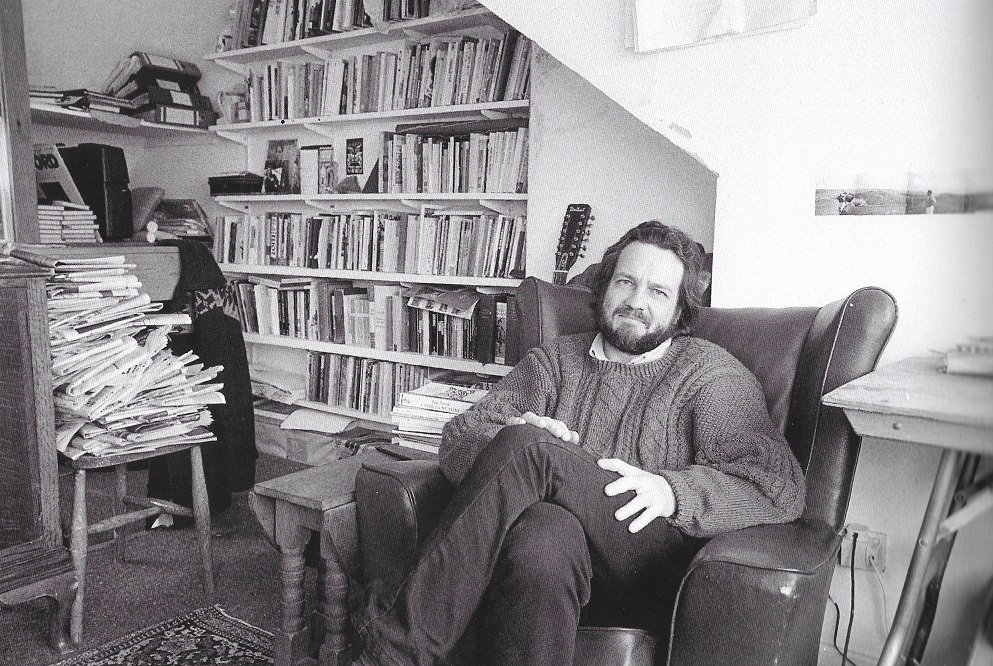
Jane Fraser: A Conversation Between Texts
I recently had the pleasure of reading Penbanc – Notes From a Welsh Farmhouse, the debut publication by Gaynor Funnell, recipient of the 2022 Nigel Jenkins Literary Award from Swansea University, generously supported by Ali Anwar, founder of the H’mm Foundation.
I also had the pleasure of seeing her launch her book on 9th December, at an evening devoted not only to the memory, but to the legacy, of Wales’ much-missed (and possibly undervalued?) poet and psychogeographer, Nigel Jenkins.
The evening brought to the fore in my memory, the practical research strategies necessary to achieve authentic place writing set out in Jenkins’ poem “Advice to a Young Poet”.
I recall Nigel Jenkins as my PhD mentor, psychogeographer, and poet, urging writers not to take the easy way out by employing the ‘desk top’ method of writing place, but rather, us writers needing to put the footwork in, and get to know our ‘milltir sgwar’ ahead of putting pen to paper.
In this way, it ensured that place would be rendered real again on the page when we later set to work at ‘the making table’.
He states it beautifully here:
“Know your place – its rocks, its soils,
the movement of its waters –
not only by maps and histories
but by body and residential mind.
Walk it, eat it, drink its rain,
ask among its breezes
for sign and sound
of those who filled their lungs here
when mammoth roamed
or when coal was a possibility of trees –
dis-cover your community.
*
Know your place. What legends and myths
have had their shaping here?
What stories, novels histories?
And who have been denied a voice?
What songs, here,
await their singing?
And how, in this place, worker of the word,
Might you make yourself useful?”
Funnell’s Penbanc is an exemplar of Jenkins’ urgings. Funnell, though not a poet, and as she says herself, a writer who has appeared fresh later in life rather than when chronologically young, has proved herself to be an original and effective ‘worker of the word’ and has most definitely made herself ‘useful’.
Written with the immediacy of the present tense, Funnell invites the reader to take a wander and drift with her through the seasons at Penbanc, the north-Pembrokeshire farm and land she loves.
Her writing reveals her deep consciousness and understanding of the multiple layers of place. As she walks, she asks the reader to consider whether you can love a place so much, that the memories it holds can be so heavy that the weight of staying in that place becomes unbearable.
Forensic. Informative. Contemplative. Funnell’s Penbanc is all this.
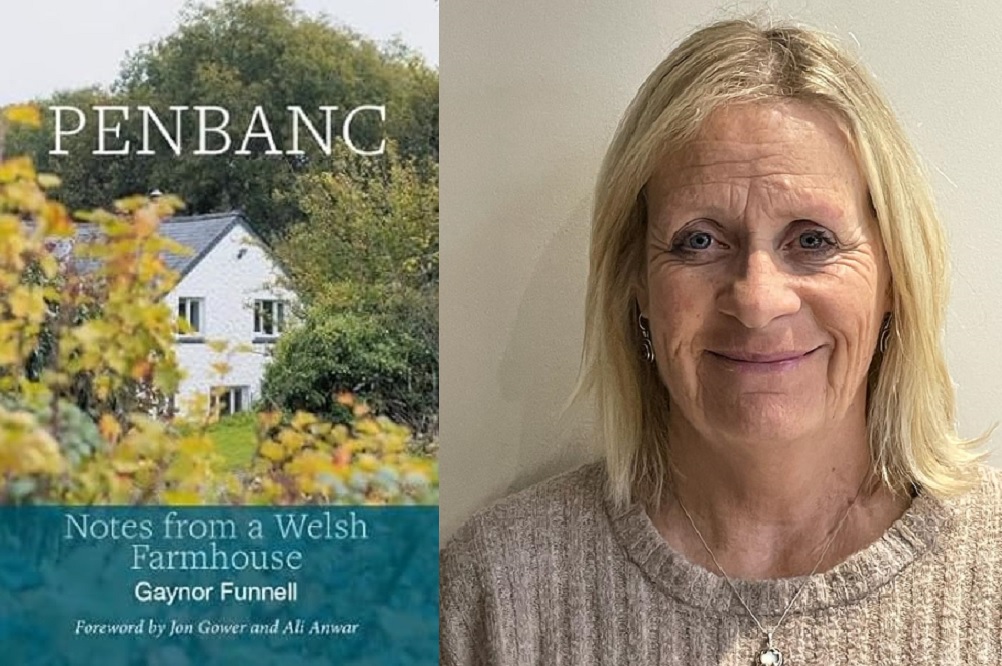
Funnell succeeds in creating a deep map that illustrates the intersection of geography, history, myth, magic and her own personal and brave emotional responses to what she encounters as she navigates love, loss and Lockdown.
Perhaps no-one can summarise what Penbanc is about, really about, better than the author herself. As Funnell states: “Place, and what is contains – wildlife, the soil, influence of the weather, history, myth, memories of people past and present – is everything.”
As place can leave its mark on a person as evidenced by the relationship between Penbanc and Funnell, so the reading of Penbanc has left an emotional mark on this reader.
I found it to be a deeply affecting and intimate meditation and testament to Jenkins’ words in action. I know he will be looking down, smiling and be proud of his legacy.
Penbanc – Notes From a Welsh Farmhouse by Gaynor Funnell published by H’mm Foundation December 2023
“Advice to a Young Poet” from Hotel Gwales by Nigel Jenkins published by Gomer Press 2006
Read more from Jane Fraser here.
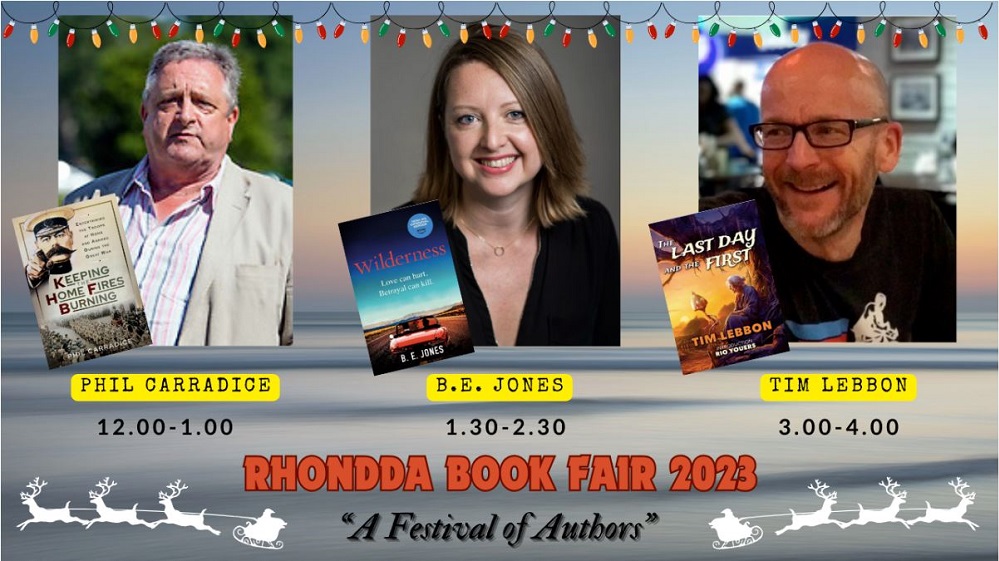
Jonah Jones
At the beginning of December, Colin Parsons organised the Rhondda Book Fair in Penygraig. Dormant over the Covid patch, it returned well rested and in fine fettle this year.
Some book fairs are a touch daunting in that you’re faced with an aircraft hangar-full of stalls fronted by authors whose smiles are aching into rigidity but this was on a much more intimate scale in the Soar chapel and community centre, meaning that we punters could do the rounds with ease and also take in a lecture whilst slurping coffee and munching home-made cake all the way.
I enjoy these sensibly-sized book fairs where I can talk to authors about their works and how they were inspired to write them but there is a slight problem for me.
I can’t have a conversation with an author and not buy a book, so I quickly ran out of bag-space, my wallet lightening, my carrier bag heavying and the balance required to manipulate wallet, business cards, coffee and cake was compromised.
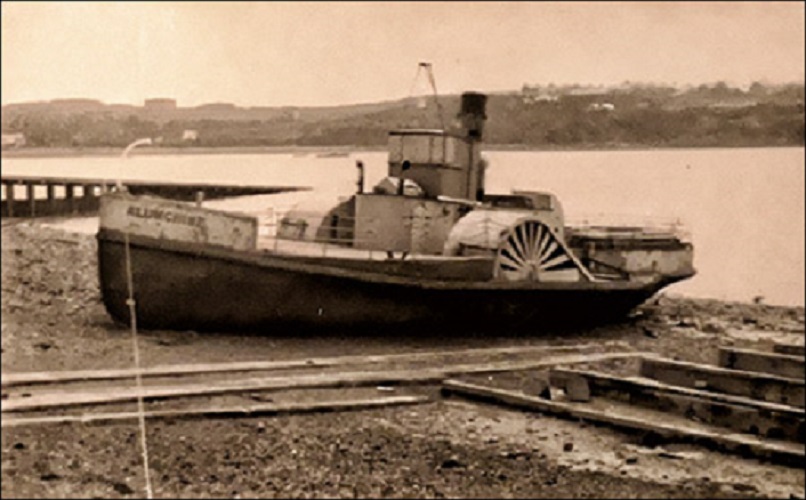
Along the path through the literary forest, I met Phil Carradice, amongst others.
We talked about childhood memories of Pembroke Dock, the Alumchine paddle-steamer ferry across the Cleddau and the mighty Sunderlands, bellowing like bison, which we could hear from my grandmother’s house the other side of Milford Haven, as they took off.
Then, in the friendly way of such festivals, this other baggily dressed man came out of nowhere and joined us, reminiscing about his childhood near the park in Swansea and how he knew Sketty, where my Aunt Jessie lived and that maybe they knew each other in a nodding-across-the-street way.
I’m looking forward to reading Phil’s book over Christmas and hope he’s there again next year so we can chat about it.
Read more from Jonah Jones here.
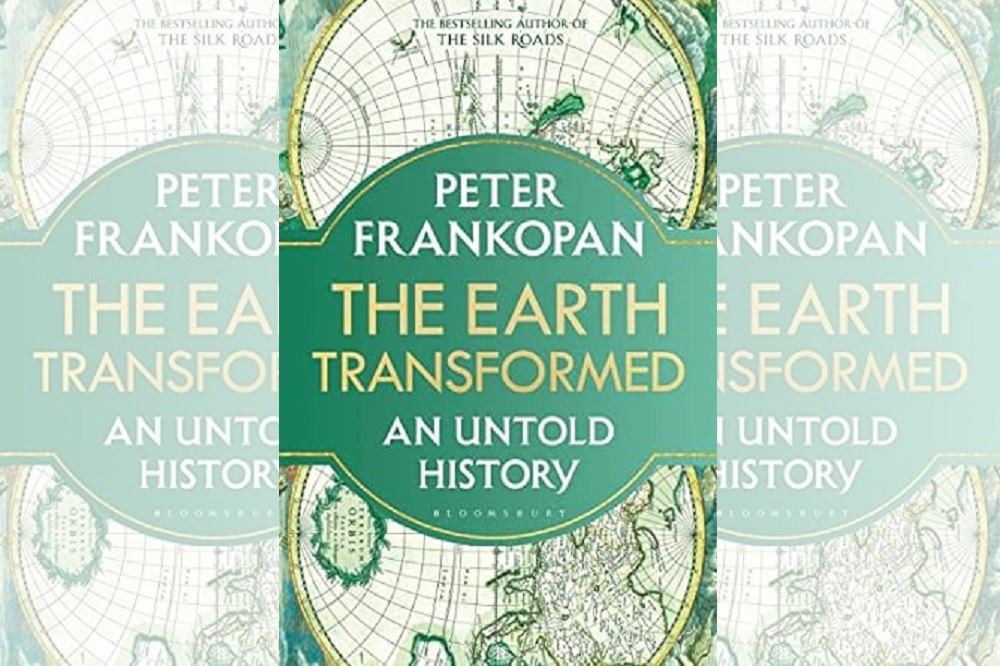
Gareth Wyn Jones
The Earth Transformed: An Untold Story, Peter Francopan, Bloomsbury (2023)
In this epic book of some 700 pages plus a separate website for footnotes, Peter Francopan seeks to recast in our understanding of history.
Conventionally history is preoccupied with the fates of great leaders, empires and states, driven sometimes by warring dogmas and virtually always by competing interests and personal ambitions. As an antidote, history has been explored from the perspective of specific groups such as black Americans, women, the working class, the Welsh or technological innovation.
Rarely has human history been placed firmly in its environmental and climatic context, although the impacts of some extreme environmental events such as the Bubonic Plagues (- Justinian plagues [starting 541], Black Death [~1350]), the dispersal of the Spanish Armada [1588], Napoleon’s retreat from Moscow [1812], are recognised.
In “The Earth Transformed; an Untold Story” the author places the environment at centre stage. He sees climate and disease – their variability, unpredictability and impact – as underlying themes influencing on all human history. He shows how the physical and biological environment, be it extreme weather, longer-term climatic trends, volcanic-, pest- or disease- eruptions, has modified and sometimes determined human destiny. But always in macabre dance with human agency.
Human history before and after the Industrial Revolution is replete with examples of powerful men (usually) or small groups creating great empires. But the tyrants then being overthrown by events for they were ill-prepared.
Hubris and disaster are twins. Such catastrophes were often environmentally-driven – – droughts, volcanic eruptions and various diseases and pests. They brought havoc, misery and death to the ordinary people, as well as the decline and fall of great empires. The common denominator in most cases was food shortages.
Chairman Mao may have believed ‘Power may come out the mouth of gun’ but, much more broadly it has always depended on the control of energy. Historically this has been largely ‘calorific’ food energy and the ensuing control of manpower which was the source of military and political power.
For the last two hundred years or so, power has accrued from the control of fossil fuel energy sources – coal then oil and gas, with the environment and social consequences we now face. Historically, not only are human societies affected by their environment but they, unthinkingly, bring about, for good or ill, major changes in that environment.
As in his “The Silk Roads”, Francopan is also at pains to correct any hint of Euro- or Anglo- centricity. The stage is the world and his time-frame starts with the emergence of humans. In this he is following the example of the great English historian Arnold Toynbee in his last book “Mankind and Mother Earth”. However with the advantage of the new techniques and data which have allowed a much more penetrating analysis of environmental and historic change.
This volume is not without its problems. It is a very long, hard read and inevitably, given its ambition, can be criticised for some detail and omissions. Nevertheless, it is a magnificent achievement and makes a compelling case, which should reset our attitudes and understanding.
It is an essential book for our age and the challenges we face. It deserves to be widely read and its insights acted upon.
The Earth Transformed: An Untold Story, Peter Francopan, Bloomsbury (2023)
Read more from Gareth Wyn Jones here.
Support our Nation today
For the price of a cup of coffee a month you can help us create an independent, not-for-profit, national news service for the people of Wales, by the people of Wales.





